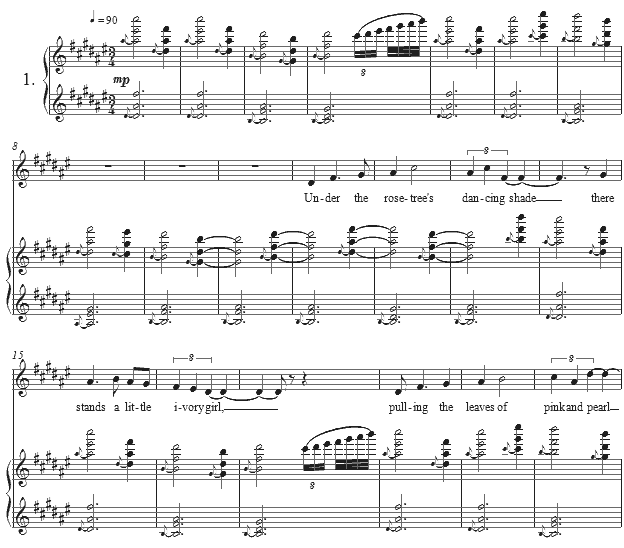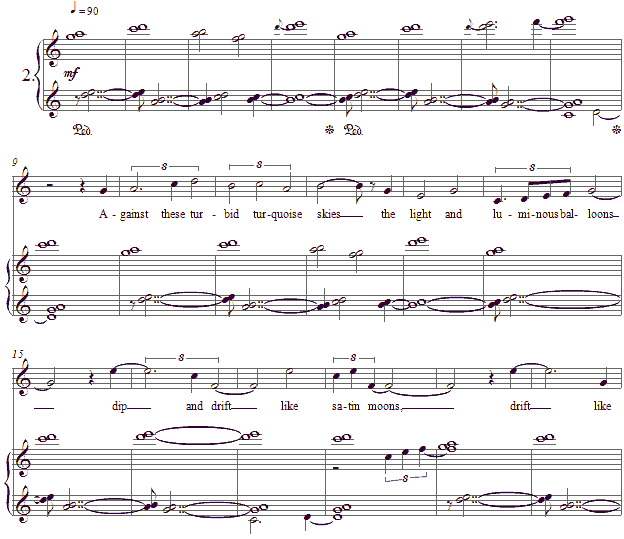Music and Texts of GARY BACHLUND
Vocal Music | Piano | Organ | Chamber Music | Orchestral | Articles and Commentary | Poems and Stories | Miscellany | FAQs
Fantaisies Décoratives - (2006)
Oscar Wilde
for soprano and piano (or harp)for Alexandra Wilson
i. Le Panneau [ 7 pages, circa 5' 45" ]
Under the rose-tree's dancing shade
There stands a little ivory girl,
Pulling the leaves of pink and pearl
With pale green nails of polished jade.
The red leaves fall upon the mould,
The white leaves flutter, one by one,
Down to a blue bowl where the sun,
Like a great dragon, writhes in gold.
The white leaves float upon the air,
The red leaves flutter idly down,
Some fall upon her yellow gown,
And some upon her raven hair.
She takes an amber lute and sings,
And as she sings a silver crane
Begins his scarlet neck to strain,
And flap his burnished metal wings.
She takes a lute of amber bright,
And from the thicket where he hides
Her lover, with his almond eyes,
Watches her movements with delight.
And now she gives a cry of fear,
And tiny tears begin to start:
A thorn has wounded with its dart
The pink-veined sea-shell of her ear.
And now she laughs a merry note:
There has fallen a petal of the rose
Just where the yellow satin shows
The blue-veined flower of her throat.
With pale green nails of polished jade,
Pulling the leaves of pink and pearl,
There stands a little ivory girl
Under the rose-tree's dancing shade.
ii. Les Ballons [ 3 pages, circa 3' 00" ]
Against these turbid turquoise skies
The light and luminous balloons
Dip and drift like satin moons,
Drift like silken butterflies,
Reel with every windy gust,
Rise and reel like dancing girls,
Float like strange transparent pearls,
Fall and float like silver dust.
Now to the low leaves they cling,
Each with coy fantastic pose,
Each a petal of a rose
Straining at a gossamer string.
Then to the tall trees they climb,
Like thin globes of amethyst,
Wandering opals keeping tryst
With the rubies of the lime.
[ Total duration: 10 pages, circa 8' 45" ]
Oscar Wilde
Oscar Wilde (1854-1900) was Dublin born, Oxford-educated and seemed to live between many cultural worlds, taking studies in classics and Greek at Oxford and thereafter working as playwright, writer and poet, commentator, pundit and wit. Some of his poems are souvenirs of his travels throughout Europe, and these small poems are titled with French names, though the first is a word painting of a Chinese panel, and the second a descriptive verse of balloons loosed into the sky. Imprisoned for two years at hard labor in England for "homosexual offenses," among his poems is the oft-cited "Ballad or Reading Goal," a commentary on prison and an execution by hanging.
While some critics of Wilde have made their small mark with commentaries (Punch magazine wrote the predictable pun, "The poet is Wilde, but his poetry's tame" while a recent yet eminently forgettable academic managed to attack his work by remarking that he was "more than usually immature in his slavish regurgitation of diverse and unassimilated poetic tags"), the body of Wilde's work, crowned by such plays as The Importance of Being Earnest and Lady Windemere's Fan, leaves Wilde as a creative artist of world rank, and his critics merely obscure.
Much has been made of Wilde's homosexuality, though bisexuality might be equally named as he was married too and sired two sons; that some creative people are straight and others gay or bisexual means essentially nothing to me in terms of the artistic works they have produced, for creativity and art cannot be linked to sexual proclivities in particular, and to make such a claim -- as have radical feminist musicologists, for example -- is an empty pursuit worthy of little notice in the larger scheme of art across centuries, just as other criticisms, however amusing to the cognoscenti, might make for interesting biographical but contribute little to the works of art which such people have left to the world.
Written for soprano, the tessitura rises to an A-sharp in the first of these songs, "The Panel," which describes the various colors and hints at the materials from which this Chinese panel was fashioned. The six-note, opening chords hint at the delicate nature of the elements which might make up the pictures on the panel. Written in D-sharp minor, the accompaniment also hints at the "amber lute" with which the "ivory girl" accompanies herself. In two climaxes, the vocal line rises to G-sharp as she cries, and then A-sharp as she "laughs a merry note." The last phrases mirror the reverse order of the last strophe as it reverses the language of the first, and a short piano epilogue concludes the setting.
The second setting opens with a visual nod to the balloons freely blowing in mild winds in the sky, seconds placed high as if balloons attached together. Perhaps loosed by children -- which would be and often is a tragedy to the child who loses a balloon -- the poem sets about to paint these balloons with words; as with "The Panel," the clearest features are their colors, and then their shapes and movements.
Alexandra Wilson
Having met and performed for some time with Australian soprano, Alexandra Wilson, I was impressed by both her technique and and voice itself. A young wife and mother now living and working in Venice, she is an admirable artist. Speaking about her new child brought thoughts to me about lullabies which, in turn, inspired the delicate opening gestures of the first song setting and inspired that which followed in the act of composing. These songs are a compliment to her as a performing artist.
The score for Fantaisies Décoratives in the medium key is available as a free PDF download, though any major commercial performance or recording of the work is prohibited without prior arrangement with the composer. Click on the graphic below for this piano-vocal score.



